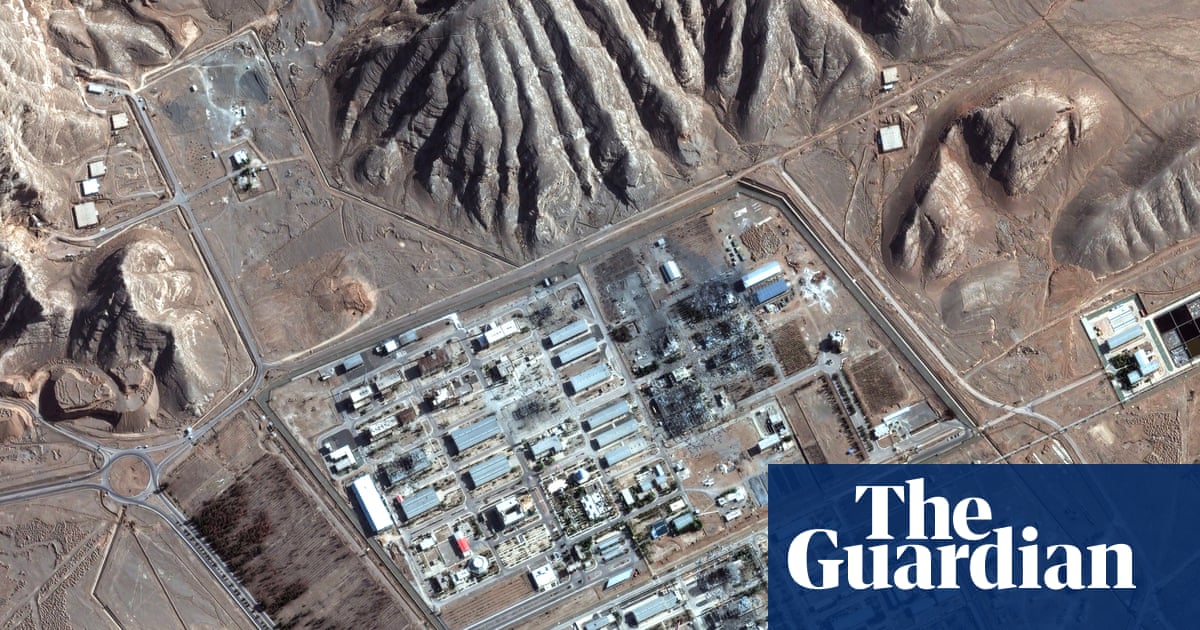The UK, France and Germany are expected to announce on Thursday that they will reimpose sweeping sanctions on Iran for failing to readmit UN inspectors into all of its nuclear sites.
The decision, under consideration for months, is likely to provoke the worst crisis in Iran’s relations with the west since Israel’s attacks on the country’s nuclear sites in June. Iran is already preparing countermeasures.
The planned reimposition of the sanctions, contained in six suspended UN resolutions, will start on 18 October when the original nuclear deal signed in 2015 expires.
The move by the three European powers – known as the E3 – cannot be vetoed by permanent members of the UN security council such as Russia and China.
The E3 is demanding Iran fully readmit inspectors from the UN nuclear watchdog the International Atomic Energy Agency (IAEA). Europe also wants details on what happened to the estimated 400kg stockpile of Iran’s highly enriched uranium after Israel’s attacks in June.
Confirmation of the partial return of IAEA inspectors on Wednesday was met with protests by officials in Tehran, who claim the strict preconditions they set have been breached.
The European countries still hope the expected formal notification to the UN that they are triggering the snapback of the sanctions will provoke Iranian concessions and further diplomacy.
Once the E3 diplomats start the process on Thursday, they have just over 30 days to press ahead or to defer the snapback, likely for six months. Negotiations may also occur at the UN over the future terms for lifting the sanctions once they have been reimposed.
The Iranian foreign ministry has warned it would respond if Europe proceeded with the snapback. Russia has proposed at the UN that the snapback of sanctions be delayed six months to 18 April to give diplomacy more time, but does not have the required votes on the UN security council.
IAEA inspectors left Iran at the start of the Israeli-US bombing campaign on the nuclear sites in June. The readmission of the inspectors is strongly opposed by those Iranians who regard the IAEA as complicit in Israel’s attacks and as little more than spies likely to hand over information directly for use by Israel. Iran has also complained that the IAEA has never condemned the Israeli attacks.
In the aftermath of the attacks that killed more than 1,000 Iranians, including their senior military and scientific leadership, the Iranian parliament passed a law setting strict preconditions on the IAEA’s return.
The IAEA director general, Rafael Grossi, said Iran had allowed inspectors to re-enter this week but they were not being permitted to visit the main bombed nuclear sites at Fordow, Natanz and Isfahan.
Instead, they were being allowed to watch the refuelling process at the Bushehr site, a requirement under the nuclear non-proliferation treaty (NPT) to which Iran is a signatory. Iranian officials also claimed only Russian inspectors from the IAEA would be permitted to visit Bushehr.
Grossi said “our work has begun but we are not yet at the point I have in mind. The talks must continue to reach better conclusions. This issue must be resolved as soon as possible because inspections cannot be limited to non-targeted facilities. There is no such thing as selective inspections.”
Iran’s deputy foreign minister, Kazem Gharibabadi, portrayed the Bushehr inspection as a special case to prevent it being shut down – something Iran wants to avoid.
The brinkmanship over the nature of Iran’s nuclear programme has lasted more than two decades. Indirect talks between the Trump administration and Iran this year broke down over the US’s refusal to allow Tehran to continue to enrich uranium domestically.
Iran is also managing a domestic audience still furious at the Israeli attacks in June. Long and bitter divisions have been revived between those who want Iran to shun an untrustworthy west, and those who say Iran’s economy depends on western cooperation.
Faced with this perennial infighting and raw public anger, Iranian foreign ministers moved too slowly to dissuade the European powers from playing its powerful snapback card.
The sanctions that Europe is reimposing were lifted when Iran signed the original nuclear deal in 2015. The move has economic and political consequences. The Iranian economy is reeling from water and energy shortages, and a further set of sanctions backed by the authority of the UN will only isolate Iran further.
The impact will probably be greatest on arms sales, but will also bring restrictions on Iranian shipping. Once reimposed, the sanctions can only be lifted if all five permanent members of the UN security council agree.
European powers privately recognise it is difficult for Iran to re-engage in diplomacy so soon after the Israeli-US attacks, but the October expiry date for the nuclear deal means Europe’s remaining leverage over Iran will also run out in just a few weeks.
In an attempt to calm suspicions in the Iranian parliament that it is about to readmit the inspectors, the foreign ministry stressed no agreement had been reached on the modalities of wider inspections. It said leaked written proposals revealed and denounced in the parliament on Wednesday were only draft texts being exchanged by both sides.
Iran could respond by withdrawing from the NPT but the International Crisis Group said Iran might instead choose to terminate a 1974 agreement with the IAEA that sets the parameters for the agency’s access and oversight of nuclear material.
